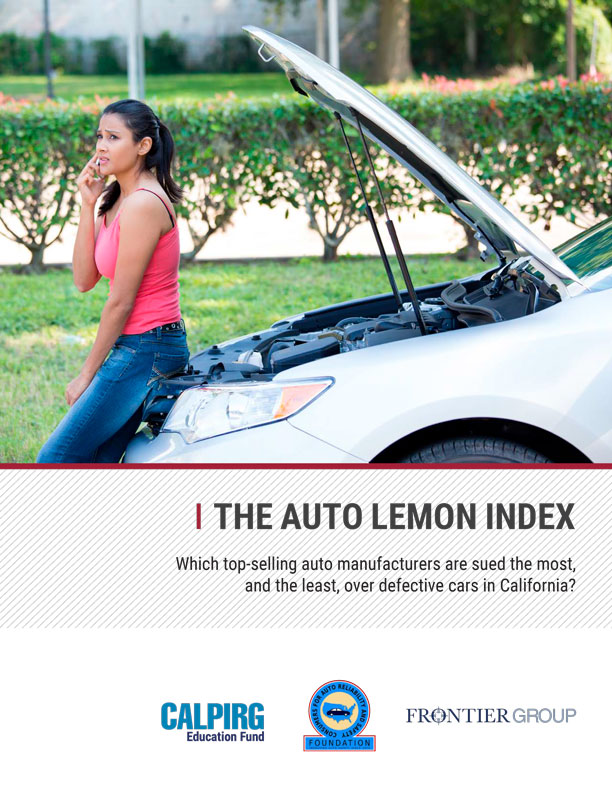
The Auto Lemon Index
Which top-selling auto manufacturers are sued the most, and the least, over defective cars in California?
A new report by CALPIRG Education Fund, the Consumers for Auto Reliability and Safety (CARS) Foundation and Frontier Group reveals the auto manufacturers that are sued the most and least often under California’s auto lemon law, compared to their market share, over selling seriously defective cars in the Golden State.

Downloads
For 40 years, California’s landmark auto Lemon Law has offered protection and legal recourse to consumers who purchase seriously defective vehicles. The law, which became a model for similar state legislation across the country, continues to be one of the nation’s strongest recipes for automotive “lemon-aid,” and continues to make California roads safer today. Since its enactment in 1982, it has also been expanded to provide protections for small business owners, individual entrepreneurs, and members of the U.S. Armed Forces stationed in, or deployed from, California.
The Lemon Law requires auto manufacturers to provide vehicle owners with refunds or replacement vehicles when the manufacturers fail to fix major problems that arise at any time while under the manufacturer’s warranty.
Research into California state electronic court filings provides an unprecedented view into how likely California consumers are to wind up in court after purchasing a car, SUV or light truck from different auto manufacturers. Only a small share of defective vehicles end up in court under the Lemon Law. But there are huge variations among manufacturers in the frequency with which consumers file suit over defective vehicles, with Toyota the least-often sued, and General Motors the most-often sued, under the Lemon Law relative to their California market share from 2018 through 2021.
Few problems with defective vehicles wind up in court. Nearly all complaints about defective or dangerous vehicles are handled outside of the court system. In some cases, automakers and dealers make repairs, issue refunds, or provide replacement vehicles without being taken to court. In many other cases, consumers with defective vehicles never get as far as speaking with a lawyer. Many give up and sell their defective vehicles back to dealerships at a substantial loss.
- Among the more than 7 million new vehicles registered in California from 2018 through 2021, only 34,397 – less than one-half of one percent – resulted in a lawsuit filed in state courts.
- Further, the number of Lemon Law cases in 2021 amounted to a fraction of 1 percent of the more than 6 million vehicles in the state with serious safety defects subject to a federally mandated safety recall.
There is wide variation in the frequency with which manufacturers are taken to court under the Lemon Law.
- Toyota was taken to court under the Lemon Law only once for every 2,029 new Toyota vehicles registered in the state from 2018 through 2021. On the other end of the spectrum, General Motors became the subject of lemon litigation once for every 78 new GM vehicles registered in California. Consumers who purchased GM vehicles were approximately 26 times as likely to file a lemon lawsuit as consumers who purchased Toyotas.
- There are a number of factors that contribute to how often a manufacturer is sued over Lemon Law violations. Vehicle quality is likely a large factor; other factors include how promptly and effectively the brand’s dealerships handle problems raised by consumers; and the length of the warranty the manufacturer offers on its cars. Another contributing factor is how well a particular manufacturer addresses the severe shortage of qualified automotive technicians and software engineers for troubleshooting defects, and develops or implements fixes that actually work to remedy problems that arise in today’s highly computerized vehicles.

Consumers who pursued auto lemon litigation in California from 2018 through 2021 complained that they experienced a wide range of defects, including brake, steering, engine, transmission and electrical failures. Consumers often experienced multiple problems with their cars by the time they pursued litigation.
- Lemon vehicles are often dangerous, threatening the safety of the driver, passengers and people sharing the roads with defective cars. According to the vehicle history report provider Carfax, in 2021 there were 6.3 million vehicles with unrepaired safety recall defects being driven on California roads. These vehicles are so unsafe that the manufacturers have issued a federally mandated safety recall, and it would be a violation of federal law for any car dealer to sell them as “new” vehicles. Typical safety recall defects include catching on fire, faulty brakes, loss of steering, axles that fall apart, hoods that fly up in traffic and obscure the driver’s vision, seat belts that fail in a crash, and exploding Takata airbags that shoot metal shrapnel into the faces and torsos of drivers and passengers, causing devastating injuries or death.
- Some owners of hazardous recalled vehicles experienced lengthy delays – sometimes lasting for many months – in obtaining recall repairs and were able to use California’s auto Lemon Law to obtain refunds or safer replacement vehicles.
In addition to defects that threaten the safety of drivers and the people around them, lemons also often represent an unexpected financial and time burden for consumers and small business owners. Even though repairs are covered by the manufacturer’s warranty, lemons are usually very unreliable, and may also be unsafe. This can create hardship when owners must have vehicles towed to the dealership for repairs, are left stranded by the side of the road, or lose their only means of transportation to work, school, medical care and other necessities of modern life for extended periods while their lemon is in the repair shop.
Before state Lemon Laws were enacted, auto dealers and manufacturers insisted that their only obligation was to “attempt” warranty repairs, leaving angry and frustrated lemon owners with faulty, unreliable, often dangerous vehicles. Lemon Laws have helped change this, allowing consumers to protect themselves from both physical and financial harm when it comes to buying defective cars. The Lemon Law was an important addition to California’s consumer protection landscape 40 years ago, and it continues to be an important safeguard today. California’s landmark auto Lemon Law’s strong recipe for automotive “lemon-aid” should be preserved for consumers – including members of the U.S. Armed Forces and their families – and for individual entrepreneurs and small businesses, now and in the future.
Topics
Find Out More


5 steps you can take to protect your privacy now

Fixed for the Holidays

